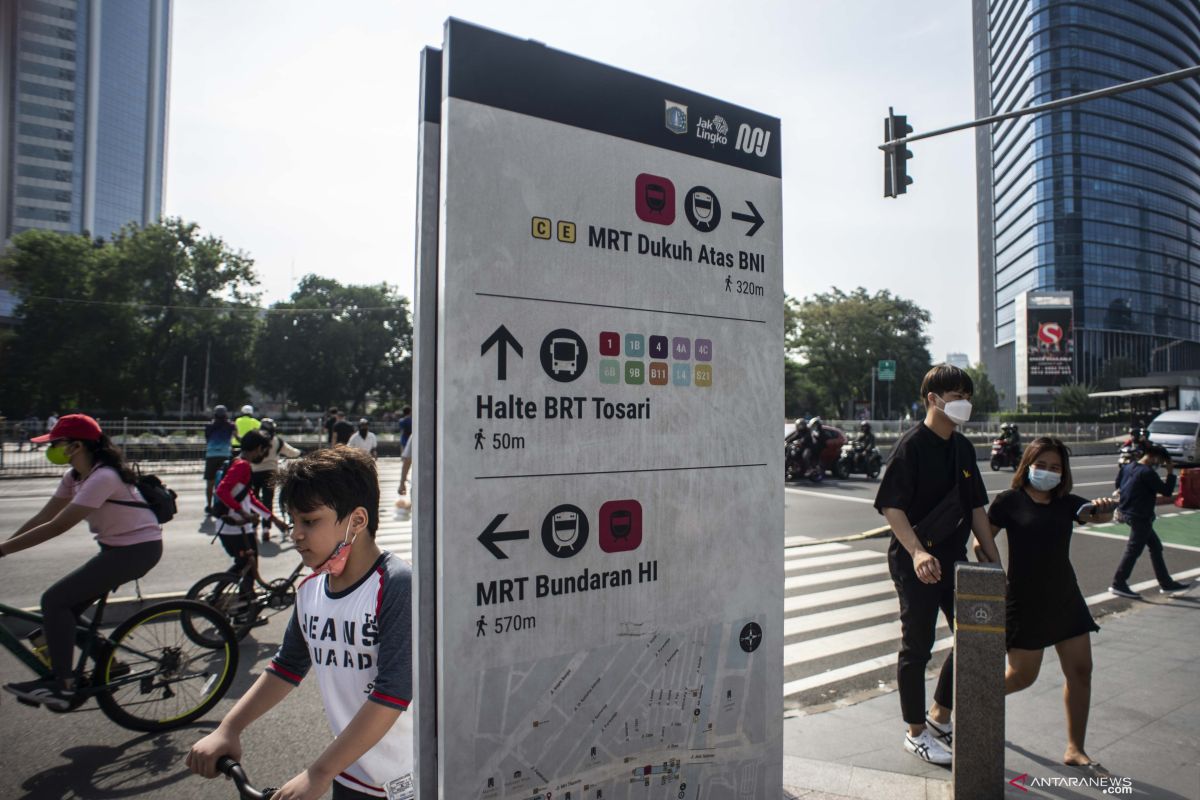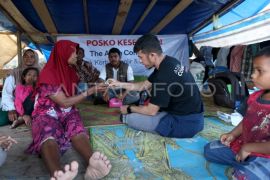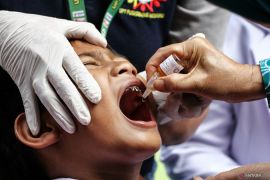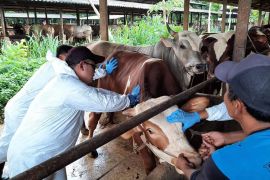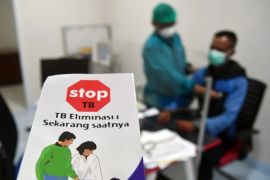Tourist attractions, restaurants, places of worship, and amusement centers are reopening under strict health protocol measures.
Wedding receptions, religious events, sports matches, concerts, festivals, conferences, exhibitions are being held, albeit with several restrictions to check COVID-19 spread.
While deciding on allowing large-scale events, the government has considered many factors, such as the recovery rate of COVID-19 patients, vaccination rate, intensified 3Ts (testing, tracing, and treatment), and a significant drop in COVID-19 confirmed cases and deaths.
"We should be grateful the current pandemic in Indonesia is getting under control. National COVID-19 data as of October 10, 2021 shows confirmed cases from 34 provinces, or 514 districts and cities, were below one thousand—894 people to be exact," Dr. Reisa Broto Asmoro, spokesperson for national COVID-19 handling and behavior change ambassador, explained.
The nation recorded 1,233 daily confirmed COVID-19 cases, 48 deaths, and 2,259 recoveries on October 13, 2021, bringing the total COVID-19 cases so far to 4,231,046, deaths to 142,881, and recoveries to 4,067,684.
The daily confirmed cases showed a significant drop compared to 56,757 on July 15, 2021. The highest daily deaths were recorded at 2,069 on July 27, 2021 when the country was battling the second COVID-19 wave that was triggered by the Delta variant.
"Of course, this is all due to the hard work of all parties, both the government through its 3T, or testing, tracing and treatment, efforts, as well as expanding vaccination rate and coverage, and the public adherence to health protocols and the government's vaccination program," Dr. Asmoro said.
Based on data from the website asia.nikkei.com, as of September 30, 2021, the COVID-19 recovery index in Indonesia has increased, making it the leading country in terms of the recovery rate (54.5 percent) in Southeast Asia.
Besides that, Indonesia has become the fifth country globally to vaccinate more than 100 million citizens, according to Health Minister Budi Gunadi Sadikin.
"Currently, more than 163 million vaccine doses have been administered. More than 100 million citizens have received the first dose vaccination and more than 50 million have received the second dose," Sadikin informed at a press conference on public activity restrictions (PPKM) on October 11, 2021.
As of now, the number of vaccine doses the country has received is 226 million. Of the total, 205 million doses have been distributed to regions across the country. The government expects to get 54.7 million more doses in October, 49.9 million doses in November, and 50.5 million doses in December this year, he added.
The nation is managing to administer around two million vaccine doses daily, he noted.
Related news: Govt continues bolstering control against COVID-19 amid case drop
Indonesia confirmed its first case of COVID-19 in March 2020, and to curb virus transmissions, the government launched a nationwide vaccination program on January 13, 2021.
Earlier, Sadikin had urged the public to start learning to adapt and coexist with the COVID-19 pandemic, saying no pandemic can end in a short period of time.
"There is no pandemic that ends in a short time. The shortest, as far as I know, is five years, but some (last up to) tens to hundreds of years. Hence, we must learn to live with it," he remarked.
To start adapting to the pandemic, the first step for everyone is to get vaccinated against COVID-19, he said. The minister, however, reminded that even after getting vaccinated, the public must adhere to health protocols and steer clear from being ecstatic or euphoric over the improvement in COVID-19 control through vaccines.
The government expects vaccination coverage to reach 80 percent by December 2021. To meet the target and achieve herd immunity, 337 million doses of COVID-19 vaccines will need to be administered across Indonesia, according to Coordinating Minister for Economic Affairs, Airlangga Hartarto.
Hartarto revealed that the Indonesian government is preparing a roadmap for a new normal era, which will be applied when the nation achieves herd immunity.
"The main prerequisites are that herd immunity must first be achieved, vaccination must be intensified up to 2.5 million doses per day, and the number of new (confirmed COVID-19) cases is less than five thousand," Hartarto noted.
Indonesia's COVID-19 handling strategy, which underscores upstream and downstream handling, has yielded good results, as reflected by a Reproduction Number (Rt) value of 0.60. This figure is relatively lower than the global Rt and that of other countries, according to Hartarto.
Related news: Umrah access for Indonesia opened due to better COVID-19 handling
"Singapore's figure is1.44; the UK, 0.97; the world, 0.92; the US, 0.9; India, 0.86; the Philippines, 0.85; and Malaysia, 0.81. Hence, Indonesia is one of the best in handling COVID-19," the minister noted.
The government's policy—enforcing people's activity restrictions (PPKM), increasing testing and tracing, and accelerating vaccinations—has helped cut the number of active COVID-19 cases by 94.59 percent from the peak on July 24, 2021, and by 53.81 percent in the last two weeks, he said.
To prepare for a new normal of living with COVID-19, spokesperson for the COVID-19 Task Force, Prof. Wiku Adisasmito, has pressed for stricter supervision of community activities.
"During this period of coexistence with COVID-19, it is necessary to conduct stricter supervision in accordance with real data on the field by taking into account the situation," he explained.
A disciplined and strict approach to following the health protocols is the most necessary aspect for coexisting with COVID-19, and turning the pandemic into an endemic, he said.
Adisasmito said that he believes that behavioral modification is a complex aspect that takes time. Thus, the government needs to continuously remind the public to consistently adhere to the health protocols, so that they are commonly practiced by people in their day-to-day activities, he noted.
Thus, the government is also preparing policies that support behavioral changes that are healthy and safe, he said.
Furthermore, the public has been warned of a possible third wave of COVID-19 that could emerge in December, when there will be a long holiday. Hence, it's too premature for euphoria as COVID-19 infections remain a threat.
Related news: Airport operator to offer incentives for international flights in Bali
Related news: Bali is ready to welcome international tourists: Tourism Ministry
Editor: Rahmad Nasution
Copyright © ANTARA 2021
